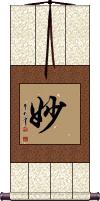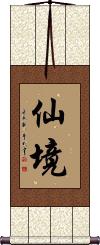Many custom options...
And formats...

Wonder in Chinese / Japanese...
Buy a Wonder calligraphy wall scroll here!
Personalize your custom “Wonder” project by clicking the button next to your favorite “Wonder” title below...
Switched to secondary search mode due to lack of results using primary.
These secondary results may not be very accurate. Try a different but similar meaning word or phrase for better results. Or...
Look up Wonder in my Japanese Kanji & Chinese Character Dictionary(My dictionary is a different system then the calligraphy search you just tried)
If you want a special phrase, word, title, name, or proverb, feel free to contact me, and I will translate your custom calligraphy idea for you.
Clever / Superb / Wonderful
The meanings for 妙 include: clever; wonderful; strange; unusual; superb; excellent; beautiful; mystic; supernatural; profound; mysterious; good; surpassing; fine, lovely, charming; special; outstanding; incomparable.
As you can see, this single character can mean a lot of things (a bit ambiguous).
Paradise / Wonderland
These search terms might be related to Wonder:
Miracle
Miracle / Marvel
Phenomenon
The following table may be helpful for those studying Chinese or Japanese...
| Title | Characters | Romaji (Romanized Japanese) | Various forms of Romanized Chinese | |
| Clever Superb Wonderful | 妙 | myou / myo | miào / miao4 / miao | |
| Paradise Wonderland | 仙境 | sen kyou / senkyou / sen kyo | xiān jìng xian1 jing4 xian jing xianjing | hsien ching hsienching |
Successful Chinese Character and Japanese Kanji calligraphy searches within the last few hours...





